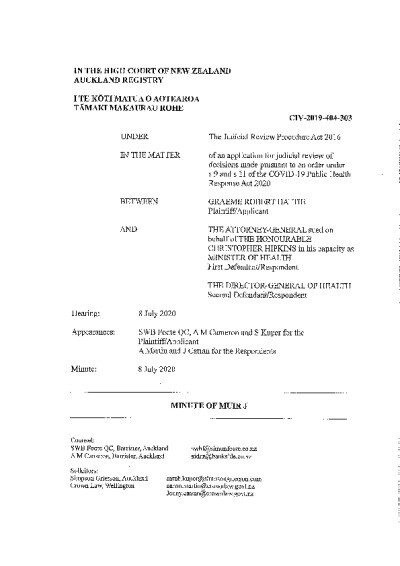
Date
Geographical Area
Pacific
Countries
New Zealand
Case Name
Hattie v Attorney-General & Director-General of Health
Case Reference
CIV-2019-404-303
Name of Court
High Court of New Zealand
Key Facts
In response to Covid-19, on 9 April 2020, the New Zealand Government announced that anyone entering the country from midnight that day would be subject to compulsory managed isolation for a period of 14 days, or until they tested negative. This is governed by the Health Act (Managed Air Arrivals) Order 2020. When in managed isolation, travellers were not permitted to leave the isolation facility except for planned exercise, emergencies, accessing healthcare or moving to another isolation or quarantine facility. Nor are family and friends permitted to visit. However, at the time, a traveller might be permitted to leave temporarily for “any exceptional ground”.
After arriving in New Zealand from England, Robert Hattie was required to complete this 14-day quarantine in a managed isolation. During his managed isolation stay Hattie was told his father’s health had deteriorated and he was highly unlikely to survive until Hattie completed his 14 days. At this time, all compassionate leave from managed isolation facilities had been suspended, so Hattie was unable to visit his father.
After arriving in New Zealand from England, Robert Hattie was required to complete this 14-day quarantine in a managed isolation. During his managed isolation stay Hattie was told his father’s health had deteriorated and he was highly unlikely to survive until Hattie completed his 14 days. At this time, all compassionate leave from managed isolation facilities had been suspended, so Hattie was unable to visit his father.
Decision and Reasoning
Hattie’s father passed away the night before the hearing. For this reason, the application for interim relief was withdrawn and the substantive proceedings were discontinued. However, the judge noted that, in his provisional view, the suspension of all compassionate leave from managed isolation (regardless of country of origin, test status, confidence in compliance conditions and other personal risk factors) appeared to be inconsistent with the proper exercise of discretion under clause 8(2) of the Covid-19 Public Health Response (Air Border) Order 2020. He reached the provisional conclusion that “any exceptional ground” does include compassionate grounds, so urged the Director-General of Health to readdress the suspension.
Outcome
The proceedings were discontinued.
Exceptional circumstances exemptions were subsequently allowed for compassionate reasons such as visiting dying relatives; however, they were rarely granted. To be granted such an exemption, there must be a very low public health risk and that risk must be able to be managed.
Exceptional circumstances exemptions were subsequently allowed for compassionate reasons such as visiting dying relatives; however, they were rarely granted. To be granted such an exemption, there must be a very low public health risk and that risk must be able to be managed.
Link
Disclaimer
This case law summary was developed as part of the Disaster Law Database (DISLAW) project, and is not an official record of the case.
Document
Document